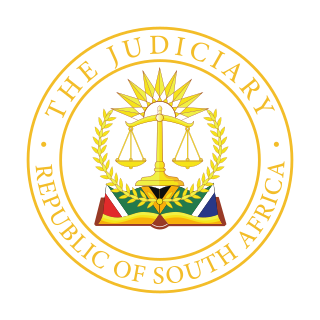Related Research Articles

The judiciary of South Africa is the body of judges and magistrates who sit in the courts of South Africa. The judiciary is an independent branch of the government, subject only to the Constitution of South Africa and the laws of the country. The Judiciary interprets the law of South Africa, using as the basis of its interpretation the laws enacted by the South African Parliament as well as explanatory statements made in the legislature during the enactment.

The government of the U.S. State of Oklahoma, established by the Oklahoma Constitution, is a republican democracy modeled after the federal government of the United States. The state government has three branches: the executive, legislative, and judicial. Through a system of separation of powers or "checks and balances," each of these branches has some authority to act on its own, some authority to regulate the other two branches, and has some of its own authority, in turn, regulated by the other branches.

The judiciary of India is the system of courts that interpret and apply the law in the Republic of India. The Constitution of India provides concept for a single and unified judiciary in India. India uses a mixed legal system based majorly on the common law system with civil laws applicable in certain territories in combination with certain religion specific personal laws.
The Judicial Commission of New South Wales is an independent statutory corporation of the New South Wales Government that provides sentencing information and continuing education to and examines complaints made against judicial officers in New South Wales, Australia.

This Commission for the Administration of Justice of Malta is the national council of the judiciary of Malta. It is set up under the relevant provisions of the Constitution, and is chaired by the President of Malta.

Judicial independence is protected by Singapore's Constitution, statutes such as the State Courts Act and Supreme Court of Judicature Act, and the common law. Independence of the judiciary is the principle that the judiciary should be separated from legislative and executive power, and shielded from inappropriate pressure from these branches of government, and from private or partisan interests. It is crucial as it serves as a foundation for the rule of law and democracy.

The Government of Rivers State consists of elected representatives and appointed officials responsible for the government of Rivers State, Nigeria. Rivers State has a population of about 5 million people, and is one of the 36 states that make up the Federal Republic of Nigeria. The state government is composed of the executive, legislative, and judicial branches, whose powers are vested by the Constitution in the House of Assembly, the Governor and the High Court. The judiciary operates independently of the executive and the legislature. At the local level, elected officials are in charge of local government areas.

The Judiciary of Kenya is the system of courts that interprets and applies the law in Kenya. After the promulgation of the Constitution of Kenya in 2010, the general public, through parliament, sought to reform the judiciary. Parliament passed the Magistrates and Judges Vetting Act of 2011. A major part of reforming the judiciary was the vetting of Magistrates and Judges in an attempt to weed out unsuitable ones. The Judicature Act has also been amended to raise the minimum number of Magistrates and Judges allowing more judicial officers to be hired. More magistrates and judges are needed to clear the backlog of cases that have caused great delay in the conclusion of cases and to staff new courts. New courts are needed to bring the courts closer to the people which is in line with devolution, a major principle written into the Constitution of 2010. New courts like the High Court opened in Garissa in November 2014 is a good example. In the past residents of North Eastern Kenya had to go all the way to Embu to access a High Court.
The National Judicial Appointments Commission (NJAC) was a proposed body which would have been responsible for the recruitment, appointment and transfer of judicial officers, legal officers and legal employees under the government of India and in all state governments of India. The commission was established by amending the Constitution of India through the 99th constitution amendment with the Constitution (Ninety-Ninth Amendment) Act, 2014 or 99th Constitutional Amendment Act-2014 passed by the Lok Sabha on 13 August 2014 and by the Rajya Sabha on 14 August 2014. The NJAC would have replaced the collegium system for the appointment of judges as invoked by the Supreme Court via judicial fiat by a new system. Along with the Constitution Amendment Act, the National Judicial Appointments Commission Act, 2014, was also passed by the Parliament of India to regulate the functions of the National Judicial Appointments Commission. The NJAC Bill and the Constitutional Amendment Bill, was ratified by 16 of the state legislatures in India, and subsequently assented by the President of India Pranab Mukherjee on 31 December 2014. The NJAC Act and the Constitutional Amendment Act came into force from 13 April 2015.
The Lagos State Judiciary is one of the three co-equal branches of the Lagos State Government organized under the Constitution of Nigeria and laws of Lagos State. The Chief Judges are appointed by the State Governor with the consent of the House of Assembly.
The Rivers State Judicial Service Commission established under section 197 (1) (c) of the 1999 Constitution is the executive body that handles matters relating to appointment, discipline and promotion of Rivers State's judicial officers and their support staffs. It is chaired by the Chief Judge of the High Court of Rivers State.
Lagos State Government is the government of Lagos State, concerned with the administration of the state ministries. The government consists of the executive, legislative and Judiciary. The government is headed by the Governor who is the policy-maker and often assisted by the commissioners and other civil servants of the state.
The Government of Ogun State consists of elected representatives and appointed officials responsible for the government of Ogun State, Nigeria. Ogun State has a population of about 2 million people, and is one of the 36 states that make up the Federal Republic of Nigeria. The state government is composed of the executive, legislative, and judicial branches, whose powers are vested by the Constitution in the Governor, the House of Assembly, and the High Court. The judiciary operates independently of the executive and the legislature. At the local level, elected officials are in charge of local government areas.
The Government of Imo State also called The Imo State Government consists of elected representatives and appointed officials responsible for the government of Imo State, Nigeria. Imo State has a population of over 4 to 5 million people, and is one of the 36 states that make up the Federal Republic of Nigeria. The state government is composed of the executive, legislative, and judicial branches, whose powers are vested by the Constitution in the House of Assembly, the Governor and the High Court. The judiciary operates independently of the executive and the legislature. At the local level, elected officials are in charge of local government areas.
The Federal Judicial Service Commission (FJSC) is an entity established by Section 153 (1) of the Constitution of Nigeria of 1999, as amended. Its primary responsibility is to advise the National Judicial Council (NJC) on nominations for key judicial appointments. These include positions like the Chief Justice of Nigeria, Justices of the Supreme Court, President of the Court of Appeal, among others. The FJSC is empowered to recommend the removal of judicial officers and exercises control over certain court personnel.
The Government of Bayelsa State consists of elected representatives and appointed officials responsible for the government of Bayelsa State, Nigeria. As at 2024, Bayelsa State has an estimated population of around 2.7 million people, and is one of the 36 states that make up the Federal Republic of Nigeria.
The Judiciary of Bayelsa State is a key branch of the Bayelsa State Government, responsible for interpreting and applying the state's laws, as well as resolving legal disputes and controversies. It plays a vital role in administering justice in the state. The judicial branch exercises this responsibility by hearing and ruling on a wide range of legal cases. The Judiciary is overseen by the Judicial Service Commission, which manages appointments, promotions, and disciplinary actions within the judiciary.

The Governor of Bayelsa State functions as both the chief security officer and the chief executive of the state government. As one of the governors of Nigeria’s thirty-six states, the governor and the deputy governor are elected by popular vote for a four-year term, with a maximum of two terms.
The Chief Judge of Bayelsa State is the head of the Bayelsa State Judiciary, which is the judicial arm of the Bayelsa State Government, as well as the chief judge of the High Court of Bayelsa State. The appointment is made by the Governor of Bayelsa State through a nomination to the Bayelsa State House of Assembly, upon the recommendation of the National Judicial Council through the Bayelsa State Judicial Service Commission.
Customary courts are the foundation of the state's judiciary, ensuring justice is based on local traditions and customs. These courts are the lowest courts in the Nigeria's judicial system and handle cases involving customary law, which reflects the traditions, values, and customs of the people, making justice more accessible and affordable.
References
- ↑ "Judicial Service Commission (JSC)". Bayelsa State Judiciary. Retrieved 2025-01-28.
- ↑ Briseimo, Teresa (2023-04-26). "Diri Swears In New Judicial Service Commission Members". BayelsaWatch. Retrieved 2025-01-28.
- ↑ ADM (2023-04-26). "New Bayelsa Chief Judge". BayelsaJudiciary. Retrieved 2025-01-28.
- ↑ Bassey, Willie (2024-09-18). "Stop disrespecting judges, Bayelsa CJ warns lawyers - Daily Trust". Daily Trust News. Retrieved 2025-01-28.
- ↑ An Almanac of Contemporary and Comparative Judicial Restatements (ACCJR Supp. i Private Law). Almanac Foundation. 30 January 2015. Retrieved 14 May 2015.
- ↑ "National Judicial Council". njc.gov.ng. Retrieved 2025-01-28.